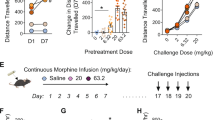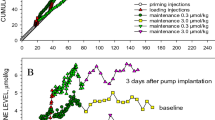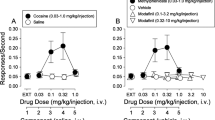Abstract
THE finding that theophylline, which inhibits brain cyclic AMP phosphodiesterase1, produces a “quasi-morphine abstinence syndrome” that is intensified by naloxone and suppressed by heroin2 suggested that the real morphine abstinence syndrome may be associated with increased activity of a brain cyclic nucleotide. A suitable phosphodiesterase inhibitor would therefore heighten and a stimulant of phosphodiesterase would lower the intensity of real morphine abstinence signs. To test this, we administered such drugs to morphine-dependent rats shortly before withdrawal was precipitated with naloxone, so that the drugs would act only during the expression of abstinence. As these experiments indicated that the abstinence syndrome is largely associated with increased cyclic nucleotide activity, we attempted to identify the nucleotide by intracere-broventricular injection of cyclic nucleotides. These experiments indicated that cyclic AMP rather than cyclic GMP was primarily involved.
This is a preview of subscription content, access via your institution
Access options
Subscribe to this journal
Receive 51 print issues and online access
$199.00 per year
only $3.90 per issue
Buy this article
- Purchase on Springer Link
- Instant access to full article PDF
Prices may be subject to local taxes which are calculated during checkout
Similar content being viewed by others
References
Beer, B., Chasin, M., Clody, D. E., Vogel, J. R., and Horovitz, Z. P., Science, 176, 428–430 (1972).
Collier, H. O. J., Francis, D. L., Henderson, G., and Schneider, C., Nature, 249, 471–473 (1974).
Collier, H. O. J., Francis, D. L., and Schneider, C., Nature, 237, 220–223 (1972).
Butcher, R. W., and Sutherland, E. W., J. biol. Chem., 237, 1244–1250 (1962).
Cheung, W. Y., Biochemistry, 6, 1079–1087 (1967).
Schultz, J., and Daly, J. W., J. biol. Chem., 248, 853–859 (1973).
Schultz, J., and Hamprecht, B., Naunyn-Schmiedebergs Arch. exp. Path. Pharma., 278, 215–225 (1973).
Verster, F.de B., Robinson, C. A., Hengeveld, C. A., and Bush, E. S., Life Sci., 10, 1395–1402 (1971).
Siegel, S., Nonparametric Statistics for the Behavioural Sciences, 96–104; 116–127 (McGraw-Hill, New York, 1956).
Dinneen, L. C., and Blakesley, B. C., Appl. Statist., 22, 269–273 (1973).
Mehta, C. S., and Johnson, W., Fedn Proc., 33, 493 (1974).
Ho, I. K., Loh, H. H., and Leong Way, E., J. Pharmac. exp. Ther., 185, 347–357 (1973).
Collier, H. O. J., and Roy, A. C., Nature, 248, 24–27 (1974); Prostaglandins, 7, 361–376 (1974).
Traber, J., Fischer, K., Latzin, S., and Hamprecht, B., FEBS Lett., 49, 260–263 (1974); Nature, 253, 120–122 (1975).
Sharma, S. K., Nirenberg, M., and Klee, W. A., Proc. natn. Acad. Sci. U.S.A., 72, 590–594 (1975).
Author information
Authors and Affiliations
Rights and permissions
About this article
Cite this article
COLLIER, H., FRANCIS, D. Morphine abstinence is associated with increased brain cyclic AMP. Nature 255, 159–162 (1975). https://doi.org/10.1038/255159b0
Received:
Accepted:
Issue Date:
DOI: https://doi.org/10.1038/255159b0
This article is cited by
-
Opioid use disorder
Nature Reviews Disease Primers (2020)
-
Paradoxical relationship between RAVE (relative activity versus endocytosis) values of several opioid receptor agonists and their liability to cause dependence
Acta Pharmacologica Sinica (2010)
-
Nuclear Factor κB Signaling in Opioid Functions and Receptor Gene Expression
Journal of Neuroimmune Pharmacology (2006)
-
Pharmacological action ofPanax Ginseng on the behavioral toxicities induced by psychotropic agents
Archives of Pharmacal Research (2005)
-
Involvement of cyclic AMP systems in morphine physical dependence in mice: prevention of development of morphine dependence by rolipram, a phosphodiesterase 4 inhibitor
British Journal of Pharmacology (2001)
Comments
By submitting a comment you agree to abide by our Terms and Community Guidelines. If you find something abusive or that does not comply with our terms or guidelines please flag it as inappropriate.



